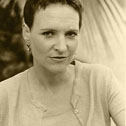
Comment
on this story
What:
Antonya Nelson
When:
Wednesday, Nov. 14 at 7 p.m.
Where:
Hodges Library Auditorium, UT campus
Cost:
Free.
|
 |

Antonya Nelson knows the rewards of fiction
by Adrienne Martini
The problem with life, Birdy concluded, was that it often did not feel obligated to play by the rules of literature.
—from Nobody's Girl
If real life had the same sense of fair play instilled in its fabric that most fiction does, Antonya Nelson's latest novel Living to Tell would have been featured by one Oprah Winfrey long before prickly Jonathan Franzen's The Corrections got this talk show host's nod. But real life, in case you've not noticed, is rarely as even-handed as one might like.
Nelson and Franzen take on a similar subject; both delve into the entanglements of family. Yet, where Franzen is smug and intellectually pompous, Nelson is straightforward and wryly observant. And where Franzen is aghast that the Oprah nod might make him lose his street cred (as well as put his book into the hands of *gasp* women), Nelson jokes that the Oprah seal would be the only thing to pull her out of academia.

"The retirement package [for professors] is attractive," she dryly retorts over the phone from her Las Cruces, New Mexico, office, "unless you have some inside scoop on Oprah."
Taken on its own, before you ever open one of her books, Nelson's resume is attractive: winner of both the Flannery O'Connor and PEN/Nelson Algren Awards, recipient of a Guggenheim Fellowship, one of The New Yorker's' "Twenty Writers for the 21st Century." Nelson has also published three short-story collections (with a fourth due in April, 2002) and three novels, of which Living to Tell is the most recent. Her day job is teaching creative writing at both New Mexico State University and in the prestigious Warren Wilson MFA program in North Carolina.
"I think one of the strange things about being a writer—a teaching writer—is the degree to which you are allowed entry into people's lives, though their fiction, oftentimes into their unconscious world," she says, when pressed to define some of the more unique aspects of her job. "Sometimes your role is a little bit like a psychologist's—you're analyzing a story and trying to see the narrative or meaning or wholeness of it when the writer's not fully aware of it yet."
In Nelson's own work, amateur shrinks could have a field day with her more impulsive characters—a credit to her skill at creating complex and interesting people and finely detailed worlds for them to live in. If Freud can be evoked for a moment, Nelson's characters' Superegos occasionally step out for a smoke, leaving their Ids a window of opportunity to get a groove on. And groove they do, if only for a moment.
But these flawed people don't exist without context; rather they are viewed within the context of family, either by its oppressive presence or its curious absence. That's not to say that Nelson writes about a milieu in which all of those daytime dysfunction-fests come to life. Her relationships are always much more complicated than trash television makes family dynamics appear.
"I write a lot about the difficulties of being in a family," she explains, "the benefits and liabilities of family entanglements. Family, to me, means the world. It's a way to be attached to the world. There's no way to over-value that—it's the most important thing, to feel connected.
"You don't choose your family. Oftentimes, especially as a child, you're forced to live with people and forced to get along with them and, sometimes, not get along with them. And there's a sort of insularity to family life that can be destructive. But I guess mostly, though, I see benefits, rather than liabilities."
Nelson's use of relationships within families as an underlying theme in most of her work can't help but lead one to think about, not only the way one's own family works, but the manner in which Nelson's family works as well. Even in this day and age, with the culture in transition between ways of thinking about the roles of both women and men in the family structure, having kids can still be a liability in the professional world, regardless of whatever benefits it may have on a personal level. Or, perhaps, that perception is quickly becoming outdated as well, at least in Nelson's experience as the mother of two, currently 10 and 14.
"It hasn't really been a problem. That's probably because I'm married to another writer [Robert Boswell] and we divide our time. He's just as interested at being a parent as I am," she says. "It's funny, he's almost never asked that question, and I'm the one who's always asked it. It kind of reveals the way we still think about family life being one that women are mostly responsible for.
"But we each have a teaching position that gives us time off to write and gives us rewards for writing. We're pretty deeply invested in fiction. And we have a housekeeper. That's been a big bonus—a great housekeeper and a great baby-sitter."
If real life were held as accountable as stories are, Oprah would be on the phone to Nelson, raving over her smart, sly books. Nelson, however, seems pretty content without the Big O's attention, and that may be more the sort of reward that only real life holds.

November 8, 2001 * Vol. 11, No. 45
© 2001 Metro Pulse
|